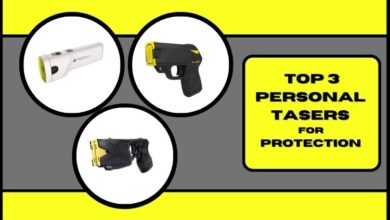A Guide To Stun Gun Laws And Permit Requirements
KEY TAKEAWAYS
In 2019, the FBI reported an estimated 1,203,808 violent crimes nationwide — equivalent to 379.4 violent crimes per 10,000 people. Aggravated assault was the most common offense among violent crimes, followed by rape, robbery, and murder or non-negligent manslaughter.
Being a victim of a violent crime will change you in ways you can’t understand. You’ll typically experience helplessness, anxiety, and rage after the crime. You might also find it difficult to stay calm and collected in situations that previously didn’t cause trouble. A violent crime is never a pleasant experience for anyone. So, how can you protect yourself in the 21st century?
Some people prefer to carry handguns to stop or deter their assailants, but not everyone can possess handguns. Most of the time, you are breaking many laws by carrying a loaded firearm. Other non-lethal self-defense devices are available in the market today, such as a stun gun. However, there are also certain requirements and laws that you should be aware of before purchasing one. Continue reading to learn more.
Laws On Owning, Carrying, And Using A Stun Gun
Some states in the US directly regulate the use of stun guns with laws and ordinances. They specifically refer to them by name or generally include them under the category of firearms for purposes of gun regulations. For example, Iowa’s laws on carrying handguns and other weapons consider stun guns and tasers as dangerous weapons. That said, civilians cannot possess, carry, or use tasers.
Other states cover the possession, carrying, and use of stun guns and tasers under general laws for guns and other weapons. Before purchasing your personal defense device, it’s best to be aware of these legal restrictions. Depending on your area of residence, stun guns and tasers are classified under various categories, such as:
- Weapons and defensive weapons. States whose laws and ordinances refer to “any weapon” will generally also apply to stun guns and tasers.
- Projectile devices. Gun regulations in some states apply to devices that fire a projectile, which could also cover tasers or taser stun guns, but not direct-contact stun guns.
- Weapons that can cause death, serious injury, or extreme pain. Some states enforce strict regulations for weapons that readily cause extreme pain or outright harm a person. These could include tasers or stun guns.
- Weapons capable or likely to cause death or serious injury; deadly weapons; unspecified dangerous or offensive weapons. Stun guns and tasers are known for being non-lethal alternatives to firearms and other weapons. However, there were instances where these devices caused injury or even death. In fact, at least 300 to 500 people have died from electroshock weapons. This led to some interpretations that place stun guns and tasers under this category.
Do Red Flag Laws Apply To Stun Guns
A red flag law is a gun control law that allows police, family members, or even doctors to petition a state court to temporarily take away someone’s firearms if they believe that a person presents a danger to others or themselves. Occasionally, in some states, such as Oregon, red flag laws also cover stun guns and/or tasers.
Who Can Own A Stun Gun?
Fortunately, if you live in states where stun guns are legal, there are only a few basic requirements to buy this self-defense device:
- You must be at least 18 years of age. Absolutely no states in the US allow the possession, carrying, and use of stun guns by anyone underage. This also means that it is illegal to sell, lease, give, rent, or barter a stun gun to anyone who is under the age of 18 years old.
- You must not have a felony record. It is similarly unlawful for a person with a felony record to possess, carry, and use any type of stun gun.
- You must only use a stun gun for self-defense. Basically, all states criminalize the use of stun guns for assault or situations other than self-defense. This means that you cannot use your stun gun to physically harm someone, or else you will face criminal charges. Also, if the seller has reasons to believe that you intend to use a stun gun as an attack weapon or to commit a crime, that person can deny your purchase of the device.
Do You Need A Permit?
In most states where stun guns are legal, you do not need a permit or attend training classes to possess, carry, and use your stun gun. However, you do need a permit in Wisconsin, Michigan, Illinois, and Indiana.
If you are interested in purchasing your own stun gun, visit this article by Security Forward and discover how much they usually cost.



